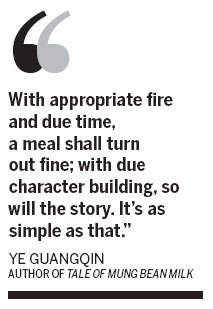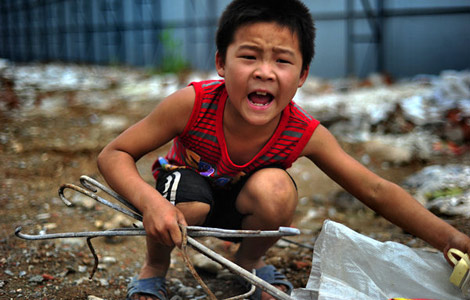A gustatory treat from Ye Guangqin
Updated: 2011-08-26 07:56
By Liu Jun (China Daily)
|
|||||||||
Some stories never grow old, such as Tale of Mung Bean Milk by Ye Guangqin.
At 63, she is probably one of the most fascinating women writers active in the country's literary scene, but largely untranslated, except in Japanese.
Coming from a noble family related to the infamous Empress Dowager Cixi (1835-1908), Ye is a versatile writer, drawing inspiration from her family background, long years working in rural Shaanxi province during the "cultural revolution" (1966-1976), and studies in Japan.
Food and Peking Opera are the two striking themes in her novels about Beijing. They easily remind readers of Lao She (1899-1966), a master wordsmith who depicted Beijing's grassroots life.
 |
In a way, Ye continues Lao She's legacy, reflecting the dramatic changes in society in the past few decades.
The novella Tale of Mung Bean Milk offers easy access to the writer's multi-dimensional world.
The teenage daughter of a declining family, clearly based on Ye herself, is suspicious of the new cook her father "picks up" from outside the Summer Palace. Looking like a beggar with a horrifying scar across her face, Mo Jiang surprises everyone with her exquisite cuisine.
Her sausages smoked with pine branches enchant the hutong; the snacks in rabbit, duck, turtle and hedgehog shapes, not only win over the young lady's heart, but also that of her first date.
It is her calm nature that impresses the young lady the most.
Mo enters the Forbidden City at 11 and serves an imperial consort of Emperor Tongzhi (1856-1875), the Empress Dowager's son.
Mo is scarred by her husband, an imperial chef who serves the last emperor of the Qing Dynasty (1644-1911) after he fled to Northeast China. Her husband, a drunkard and drug addict, sells off Mo to pay his debts. He shows up years later with a dubious son.
Mo accepts her new found family. In the early 1960s, when the whole nation was struggling with famine and political turmoil, Mo's husband brings the young lady's family much needed douzhir, or fermented mung bean milk, a traditional drink loved by grassroots Peking residents.
The porridge should be stewed over the mild flames of sawdust so it melts and melds perfectly.
In recent years, works about the lives of rich families have fascinated readers. Some authors make no effort to hide their pride about their privileged family background and pour disdain on ordinary people.
Not so with Ye. She has experienced so many ups and downs in life, she cherishes everything: be it the duck soup favored by the Empress Dowager, or the sour and even smelly mung bean milk.
The young lady hates Mo's husband at first, but she finally sees that Mo is happy, taking care of her paralyzed husband. The old couple commit suicide when their son led Red Guards into the young lady's home.
"Cooking and writing are the same," Ye says in the novella.
"With appropriate fire and due time, a meal shall turn out fine; with due character building, so will the story. It's as simple as that."











